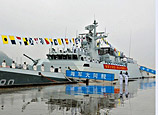
The output of China's marine economy will account for at least 13 percent of the country's GDP in 2020 from 9.6 percent now, driven by the country's surging interest in the sector, a report by a government think tank said on Monday.
The China Institute for Marine Affairs, the policy-consulting unit of the State Oceanic Administration (SOA), said that China's marine economy will see fast growth over the next two decades, with the sector expected to be worth more than 10 trillion yuan ($1.61 trillion) and provide 56 million jobs in 2020.
In 2012, the country's GDP related to the marine sector increased 7.9 percent year-on-year to more than 5 trillion yuan, according to figures released by SOA
The report added that by 2030, the marine economy output will likely account for 18 percent of the country's GDP.
Liu Yan, director of the institute's marine environment and resources department, said that as the country is eyeing the sector to boost economic growth, coastal provinces and regions will develop faster than other areas by 2030.
In these regions, emerging ocean-related sectors, including marine renewable energy, marine biotechnology and seawater desalination, will grow at the fastest speed, while the growth of some traditional marine industries, such as fishing, may see a slowdown due to government controls, the report said.
China aims to produce 2.2 million cubic meters of desalinated seawater a day by 2015, about three times the current capacity, according to a plan released last year by the National Development and Reform Commission.
The plan estimated that the fast development of seawater-desalination facilities will bring annual growth of up to 10 billion yuan to the industry.
In addition to the emerging marine sector, the report called for authorities to speed up offshore oil and gas exploration in the East China Sea and the South China Sea and achieve deep-sea oil and gas exploration at 3,000 meters below the sea level.
The oil reserves in the South China Sea are estimated to be up to 30 billion tons, accounting for about 33 percent of the country's total oil reserves, according to figures released by the Ministry of Land and Resources in 2005.
However, China does not get any oil from the South China Sea, while neighboring countries have built more than 200 drilling platforms there, the report said.
Against the backdrop of a booming marine sector, the report also warned about potential conflicts between fast exploration activities and the preservation of the fragile marine environment, especially when it comes to offshore oil and gas exploration and the construction of nuclear, thermal power and chemical plants in coastal areas.
Song Guojun, a professor of environmental science at the Renmin University of China, said the development of the marine economy should avoid the path of “pollution first, treatment later”.
The country's marine watchdog is taking steps to protect the environment. Last month, SOA issued a notice on its website banning offshore projects which may cause pollution.
In 2012, the country's severely polluted sea areas surged to 68,000 square kilometers from 44,000 sq km in 2011, according to a marine environment report released last year by SOA.
















 Many register as couples on '5.20' day
Many register as couples on '5.20' day


![]()
